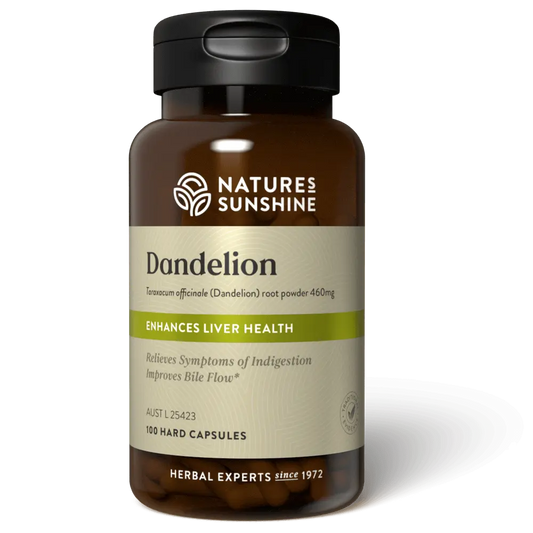Herbal Spotlight: Dandelion
Dandelion (Taraxacum officinale) is a resilient perennial herb recognised for its vivid yellow blossoms, deeply lobed foliage, and nutrient-rich taproot. Revered in traditional Western herbal medicine for centuries, Dandelion has been used to support digestive function, promote liver health, maintain internal equilibrium. Its enduring reputation reflects a botanical revered for delivering consistent, gentle support within holistic wellness practices.
Today, Dandelion continues to be esteemed for its versatility and efficacy, bridging centuries of herbal knowledge with contemporary approaches. Its role in promoting digestive comfort, stimulating natural cleansing pathways, and supporting overall vitality emphasises its position as a foundational herb in traditional herbal practice.
Herbal Snapshot
Botanical Name: Taraxacum officinale
Common Name: Dandelion
Native Region: Europe and Asia, now widely naturalised globally
Part Used: Root and leaf
Herbal Actions: Traditionally regarded as an alterative, diuretic, and digestive tonic, Dandelion has been used to support liver function, promote digestive ease, facilitate healthy bile flow, and assist the body's natural detoxification processes.
What Is Dandelion?
Dandelion is a tenacious herb, distinguished by its vibrant yellow flowers and robust taproot. In traditional Western herbal medicine, both the root and leaves have been valued for their capacity to maintain internal balance and support the body's innate cleansing mechanisms.
The root is rich in inulin, a prebiotic fibre, alongside bitter glycosides and polyphenolic compounds, traditionally associated with digestive stimulation and liver support. The leaves, rich in potassium and flavonoids, complement the root's actions by promoting gentle diuresis and contributing to internal equilibrium.
Historically, Dandelion has been prepared as teas, decoctions, tinctures, and powdered extracts. Its enduring use as a foundational botanical attests to its versatility, reliability, and efficacy in supporting digestion, liver health, and internal cleansing.
Traditional Uses of Dandelion
Dandelion has traditionally been used to support a broad spectrum of wellness concern, particularly those associated with digestion and natural detoxification. Its key traditional applications include:
Digestive Support: Traditionally used to stimulate healthy bile production and support digestive comfort.
Liver Health: Valued for its role in promoting liver health and aiding the body's natural cleansing pathways.
Diuretic Actions: Traditionally used to assist flushing of the urinary tract and to support urine output.
Internal Cleansing: Esteemed as an alterative, assisting natural detoxification and reinforcing internal balance.
Through these multifaceted actions, Dandelion has earned its reputation as a versatile herb suitable for both daily and seasonal wellness routines.
Herbal Insight
Within traditional Western herbalism, Dandelion is regarded as a foundational botanical for maintaining internal balance. Its bitter and diuretic qualities stimulate digestion, support liver function, and enhance the body's natural cleansing processes. Rather than acting on isolated symptoms, Dandelion acts across interconnected physiological systems, promoting holistic wellbeing.
Its adaptable and effective profile has made it a trusted botanical for centuries, particularly during periods of dietary indulgence, seasonal transitions, or digestive imbalance. Dandelion's multifaceted action reinforces its status as a reliable and enduring botanical in traditional herbal practice.
How To Use Dandelion
Dandelion is available in capsules, powdered root, liquid extracts, and dried herbal infusions. It is commonly incorporated to support digestion, liver health, or as part of a natural cleansing protocol.
Its gentle, versatile nature allows for both short-term and ongoing use, making it a practical addition to daily or seasonal wellness practices.
Always read the label and follow directions for use.

Nature's Sunshine Dandelion
Nature's Sunshine Dandelion is thoughtfully formulated to honour centuries of traditional Western herbal wisdom. Recognised as a liver tonic and digestive support, Dandelion assists the body's natural cleansing pathways, promotes liver health, relieves digestive discomfort, and aids in flushing of the urinary tract.
This carefully prepared formulation features powdered Dandelion root, preserving the plant's integrity, traditional character, and natural potency. Nature's Sunshine Dandelion reflects a considered, holistic approach to wellness, offering gentle and reliable support for liver health and digestive comfort.
Always read the label and follow directions for use.



